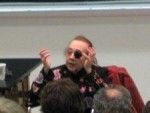Holocaust Survivor Keeps the Story Alive

Memories of a brutal war were captured and the shocking details of a personal history were unveiled in the words of the Jewish Holocaust survivor Helen Sperling, who spoke about her life before, during and after her concentration camp experience on Tuesday night to several professors and an auditorium filled to capacity with students.
Sperling’s speech was sponsored by the Jewish Studies, CORE 151 and Core Distinction Programs. Now 88 years old, Sperling was wheeled into the auditorium by the Murray W. and Mildred K. Finard Professor in Jewish Studies and Religion Steven Kepnes. Kepnes introduced her as a dear friend who has shared her story at Colgate for over 30 years.
The Donald M. and Constance H. Rebar Professor in the Humanities and Professor of English Peter Balakian formally introduced Sperling as having been an integral part of Colgate’s educational project since the mid-1970s.
“Helen has spoken regularly on campus, and her voice has been a powerful one,” Balakian said. “Her story about the war and about her life is a privilege to hear and truly important to Colgate’s moral education. Every time I have heard it, it has been more alive than before.”
Sperling started telling her story to schools and other institutions publicly in 1964. As she later noted in her speech, she first spoke about her experience in a church in New York City after her daughter faced racial discrimination at school.
“In the beginning, nobody wanted to listen,” Sperling said. “But then it spread.”
The evening began as Sperling told of her childhood in a small Polish town just outside of Warsaw, where she lived a comfortable middle class life. She attended private school, went to two years of college and then went to France to study medicine.
“I was well-loved, spoiled and independent,” she said. “My two favorite words were ‘why’ and ‘no.'”
Although Adolf Hitler came to power in 1933, the Germans did not march into Sperling’s hometown until six years later. This year, 1939, marked the end of Sperling’s lovely childhood.
“We all realized it was here,” she said. “Jews had to register and wear a yellow Star of David to identify them. If you did not obey the rule, you were killed.”
Jews were accused by the Nazis of being dirty, lazy and diseased with typhoid fever. They were also forced to give up certain valuables and items of luxury under the threat of death. Once a German came to Sperling’s house, sat down in her father’s favorite chair and ordered her mother to use precious linens to shine his boots.
“I was utterly helpless,” Sperling said. “It was the beginning of six years of utter helplessness.”
Sperling and her family were forced by the Nazis to move out of the house her father had built. When her father heard later that they had dug up his favorite lilac bushes, he was devastated.
“It was the first time I saw my father cry,” Sperling said. “It is a painful but also wonderful story because one school planted a lilac bush in my father’s honor, and now because of lilac bushes my father will never be forgotten.”
The Sperling family was soon moved into the ghetto and crowded into rooms with other Jews. The Nazis gave them curfews and surrounded their dwellings with barbed wire. If a Jew tried to leave the ghetto, he and his family were killed. Sperling did successfully escape one night to find a telephone to wish her Gentile friend happy birthday, but was met only with the response: “You dirty Jew, how dare you call me.”
“If I could erase that day from my memory, I would,” Sperling said. “My body returned to the ghetto after than phone call, but my soul was crushed.”
Sperling conducted her entire speech in an incredibly honest and collected tone, even when she was discussing the numerous ways in which Jews were murdered and the moment when she was separated from her parents, who were sent to a gas chamber. She brought framed pictures of her parents, which she showed to the audience to emphasize her personal loss.
“They are not just numbers. They are mine,” she said.
Sperling went on to recount her experiences at the concentration camps of Ravensbrück and Buchenwald, and her discussion included how the Jews were dressed and numbered, practically starved and forced to work hours upon end.
“We didn’t look human and we didn’t smell human,” she said. “They were awful days and awful nights.”
Many Jews died, many committed suicide, and many were killed by the Nazis. Sperling also told some personal stories, however, about experiences in the camps that she said helped her to survive, such as when another woman risked her life to steal a pencil and paper so Sperling could write poetry, when she refused to give in to the bribes of Nazis, and when other prisoners pushed her to the back of the crowd during a count-off so she would not have to stand in the front row.
Sperling and other survivors were finally evacuated from Buchenwald in April of 1945. Sperling spent three years in the hospital undergoing treatment for various ailments, and she then met up with her younger brother and moved to New York to start a life. She met her husband, another survivor, and adopted two children, who now have grandchildren. Even though she said she lives a comfortable life now, Sperling still has nightmares about the Holocaust.
“The days are mine, but my nights still belong to Hitler,” Sperling said.
Sperling concluded with her favorite Jewish legend, which talks of 36 righteous people who are born to save the world but don’t know it until they do so.
“Every one of you could be destined to save the world,” she said. “So, go to it. The world needs saving.”



